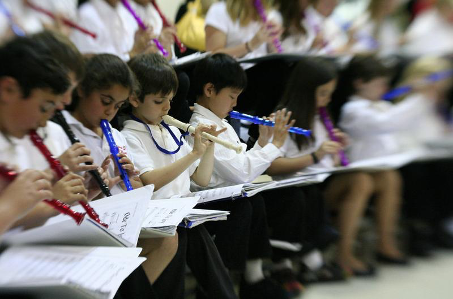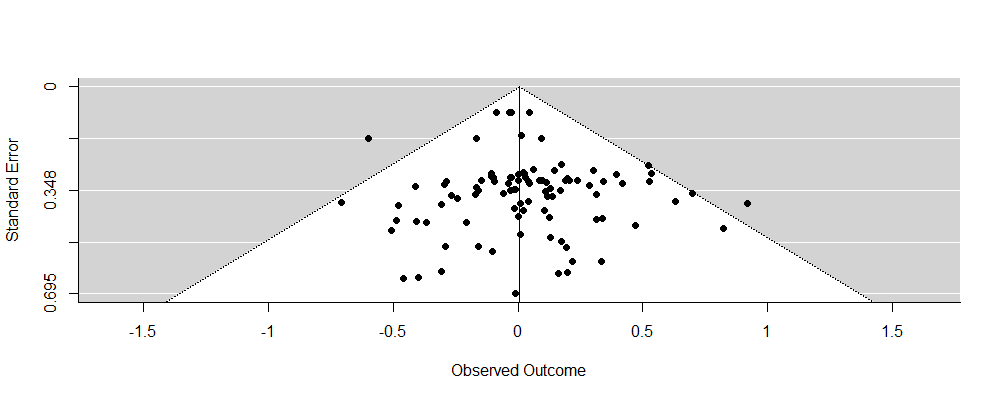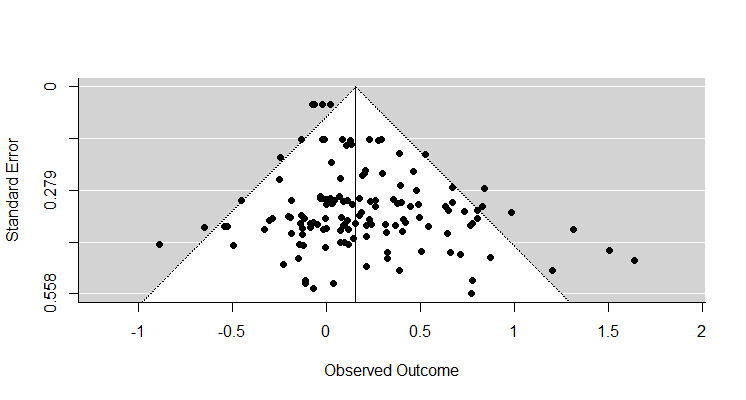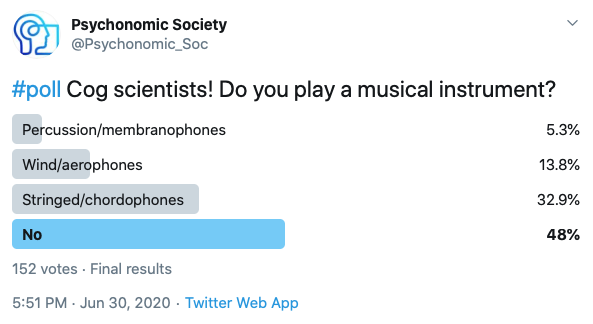Many a child has had the pleasure of entertaining their families and close neighbors with their musical stylings when learning a new musical instrument. I first enjoyed playing the recorder and then to the sheer delight of my parents, the clarinet.

My musical training lasted the duration of the requirements of the educational system in the US at the time, and not one beat longer. I have no memory of my parents pushing me to do my music homework, and my guess is that is because they didn’t (not because I forgot). The culmination of my musical “career” was a school concert in which my friend and fellow clarinetist Donna’s squeaks resulted in more laughing than playing.
Did I prematurely end my musical training? Would I have been smarter now had I carried on? Would I have had better grades had I carried on? After all, a handful of Nobel prize winners and other prominent scientists were musically inclined, including Albert Einstein (theoretical physicist) and Max Planck (theoretical physicist), Fabiola Gianotti (particle physicist and the first woman Director-General at CERN, the world’s largest scientific laboratory), and some famous musicians were preparing for careers in math and science before their musical careers took off, including Brian May (lead guitarist of Queen and astrophysicist) and Art Garfunkel (singer of Simon & Garfunkel).
We asked you, the Psychonomes, in a Twitter poll if you play a musical instrument. The results, shown in the screenshot below, are that 52% do and 48% don’t.
Both the Nobel pool and our poll are reasonably underpowered, but a recent meta-analysis published in Psychonomic Society journal Memory & Cognition on the topic was not.
So, true or false: Music helps cognitive abilities.
The commonly believed answer is that musical training helps to increase cognitive abilities, such as attention, memory, reading skills, and leads to better academic achievement.
How does musical training enhance cognitive ability? There are three main hypotheses:
- It benefits general intelligence
- It benefits working memory, which then improves learning
- It benefits sound perception, which then improves phonological processing and reading skills
Hold up! Some researchers claim that there is no benefit to cognitive abilities from having musical training. If this is true, then none of the hypotheses are needed. What’s the right answer? Does music help cognitive abilities or not?
Cue Giovanni Sala and Fernand Gobet (pictured below).
Sala and Gobet conducted a meta-analysis to settle the issue. They included all studies that
- were experimental (not correlational)
- had a one control group, cognitive tests unrelated to music or academic outcomes
- the participants were between 3-16 years of age,
- the data were presented so that effect sizes could be computed
Fifty-four studies, with a total of nearly 7,000 participants, fit the criteria. The average age was 6 ½ years and the average duration of training was about 53 hours, 30 weeks, and 53 sessions. That’s a lot of training.
They considered the following 6 moderators:
- Baseline differences
- Randomization
- Type of controls: active and non-active controls (learned another skill or did not, respectively)
- Age
- Outcome measures: non-verbal ability, verbal ability, memory, and speed
- Duration of training
Only two moderators were statistically significant: baseline differences and type of controls. In a few studies, there were large group differences in IQ at baseline and therefore these studies were removed from sensitivity analyses. To further investigate differences between types of controls, Sala and Gobel separately analyzed the two subsamples. Comparisons of groups of children who practiced music with active controls (i.e., learned another skill) yielded no effect of music training on cognitive or academic performance, which is shown in the funnel plot below. 
They found small effects in studies without active control groups, as shown in the funnel plot below. They also found a small publication bias here.
With rigorous modeling approaches, clear criteria, and accounting for publication bias, they found
“The overall impact of music training programs on cognitive and academic outcomes is weak and moderately heterogeneous…”
Given these findings, the three main hypotheses mentioned above are moot. As Sala and Gobet put it,
“…since there is no phenomenon, there is nothing to explain.”
For the Psychonomes who don’t play an instrument, rest assured, the Psychonomes who are musically inclined do not have an advantage. But we can enjoy their music, including this song by former Chair of the Psychonomic Society’s Governing board, John Dunlosky:
Featured Psychonomic Society article:
Sala, G. & Gobet, F. (2020). Cognitive and academic benefits of music training with children: A multilevel meta-analysis. Memory & Cognition, DOI: 10.3758/s13421-020-01060-2


